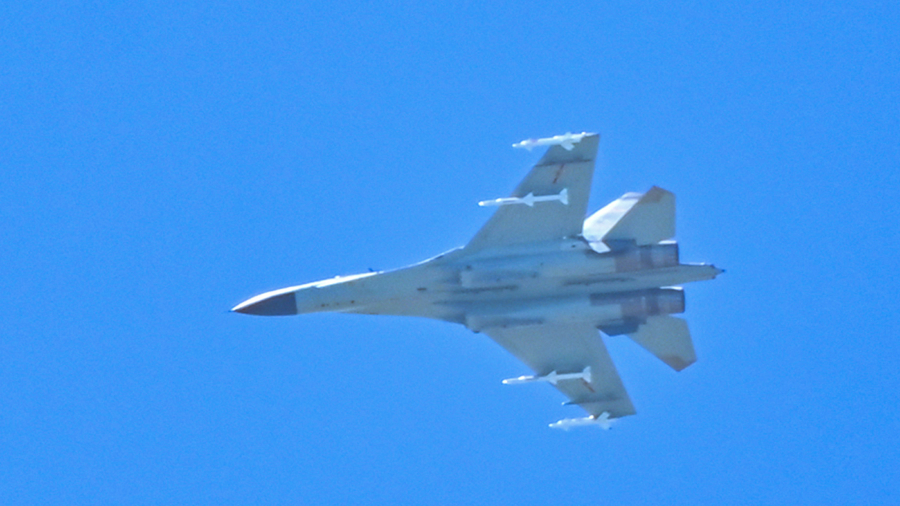Taiwan’s military said on Dec. 13 that it detected 29 Chinese aircraft and three naval vessels near its territory, 21 of which flew into Taiwan’s airspace, as the Chinese Communist Party (CCP) intensified pressure on the self-ruled island.
The Chinese aircraft and vessels were detected at around 6 a.m. (local time) on Tuesday, prompting Taiwan to deploy aircraft, navy vessels, and land-based missile systems in response, according to Taiwan’s defense ministry.
The ministry said that 21 of the detected aircraft, including 18 bombers, had entered Taiwan’s southeast air defense identification zone (ADIZ). It also detected Chinese aircraft and vessels surrounding Taiwan on Dec. 12.
The ADIZ isn’t airspace directly over the island nation but in the immediately surrounding area where identification, location information, and government control of aircraft are required for security purposes.
The CCP claims that Taiwan, which has been self-governed since 1949, is a breakaway province. Chinese leader Xi Jinping has vowed to “reunify” the island with the mainland and hasn’t ruled out the use of force in doing so.
Taiwanese Foreign Minister Joseph Wu said the CCP’s military threats against the island nation have become “more serious than ever.” Local media reported that the Chinese regime deployed 220 aircraft and 50 naval vessels around Taiwan this month.
“And we are quite sure that the Chinese may want to use another pretext of practicing their future attacks against Taiwan. So this is a military threat against Taiwan,” Wu said in an interview with The Guardian on Monday.
China Ramped Up Pressure
The CCP initiated military drills near Taiwan after a controversial visit by U.S. House Speaker Nancy Pelosi (D-Calif.) in August, firing multiple ballistic missiles over Taiwan and imposing a blockade of its international sea.
The Chinese regime had claimed that Pelosi’s visit was a violation of its supposed sovereignty over Taiwan. Wu said the CCP launched drills following the visit to deter other governments from supporting Taiwan.
“If China can do that to Speaker Pelosi’s visit to Taiwan, I think that is going to cause concern in other countries [about] whether their support for Taiwan is going to actually damage Taiwan’s national interest rather than providing real support to Taiwan,” he said.
Aside from military threats, Beijing also ramped up pressure on Taiwan through economic coercion, cyberattacks, cognitive and legal warfare, and diplomatic efforts to isolate Taiwan from the rest of the world, Wu said.
Only 14 nations—including Paraguay, Palau, Marshall Islands, and Tuvalu—have formal diplomatic ties with Taiwan. In recent years, Beijing has persuaded some of Taiwan’s allies—including Nicaragua, the Solomon Islands, and Panama—to switch allegiance in exchange for increased trade and investment.
China recently banned imports of Taiwanese alcoholic beverages and certain fishery products. The move came just days after Beijing criticized the British parliamentary committee’s visit to Taiwan as “gross interference” with its internal affairs.
James Fanell, a government fellow at the Geneva Centre for Security Policy in Switzerland and former director of intelligence and information operations for the U.S. Pacific Fleet, explained that the CCP is playing a long game.
“Due to the continuing guidance of the past three leaders of the Chinese Communist Party, the PRC has been on a 20-plus year military modernization program,” Fanell said, using an acronym for the official name of communist China, the People’s Republic of China.
The CCP’s military wing, the People’s Liberation Army (PLA), had a two-pronged goal, he said: To seize Taiwan and topple America from its place of prominence on the global stage.
“This ongoing PLA modernization program is aimed at supporting the CCP’s strategic ambition to displace the United States from the Indo-Pacific and to ultimately restore the PRC to what they believe is China’s rightful position as the leader of the world,” Fanell said.
“Today, that entails leading the global order across all levers of national power, especially in the military domain, both conventional and nuclear.”
Andrew Thornebrooke contributed to this report.
From The Epoch Times

